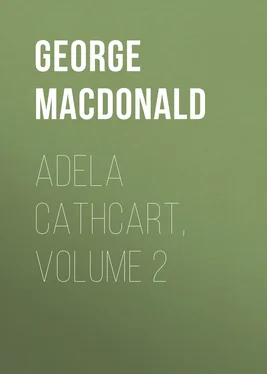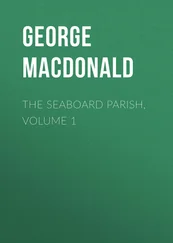George MacDonald - Adela Cathcart, Volume 2
Здесь есть возможность читать онлайн «George MacDonald - Adela Cathcart, Volume 2» — ознакомительный отрывок электронной книги совершенно бесплатно, а после прочтения отрывка купить полную версию. В некоторых случаях можно слушать аудио, скачать через торрент в формате fb2 и присутствует краткое содержание. Жанр: foreign_prose, foreign_religion, literature_19, foreign_antique, на английском языке. Описание произведения, (предисловие) а так же отзывы посетителей доступны на портале библиотеки ЛибКат.
- Название:Adela Cathcart, Volume 2
- Автор:
- Жанр:
- Год:неизвестен
- ISBN:нет данных
- Рейтинг книги:5 / 5. Голосов: 1
-
Избранное:Добавить в избранное
- Отзывы:
-
Ваша оценка:
- 100
- 1
- 2
- 3
- 4
- 5
Adela Cathcart, Volume 2: краткое содержание, описание и аннотация
Предлагаем к чтению аннотацию, описание, краткое содержание или предисловие (зависит от того, что написал сам автор книги «Adela Cathcart, Volume 2»). Если вы не нашли необходимую информацию о книге — напишите в комментариях, мы постараемся отыскать её.
Adela Cathcart, Volume 2 — читать онлайн ознакомительный отрывок
Ниже представлен текст книги, разбитый по страницам. Система сохранения места последней прочитанной страницы, позволяет с удобством читать онлайн бесплатно книгу «Adela Cathcart, Volume 2», без необходимости каждый раз заново искать на чём Вы остановились. Поставьте закладку, и сможете в любой момент перейти на страницу, на которой закончили чтение.
Интервал:
Закладка:
"And then I saw that the Lord himself was clasped in the love of the Father; that it was in the power of mighty communion that the daily obedience was done; that besides the outward story of his devotion to men, there was the inward story—actually revealed to us men, marvellous as that is—the inward story of his devotion to his father; of his speech to him; of his upward look; of his delight in giving up to Him. And the answer to his prayers comes out in his deeds. As Novalis says: 'In solitude the heavenly heart unfolded itself to a flower-chalice of almighty love, turned towards the high face of the Father.' I saw that it was in virtue of this, that, again to use the words of Novalis, 'the mystery was unsealed. Heavenly spirits heaved the aged stone from the gloomy grave; angels sat by the slumberer, bodied forth, in delicate forms, from his dreams. Waking in new God-glories, he clomb the height of the new-born world; buried with his own hand the old corpse in the forsaken cavern, and laid thereon, with almighty arm, the stone which no might raises again. Yet weep thy beloved, tears of joy, and of boundless thanks at thy grave; still ever, with fearful gladness, behold thee arisen, and themselves with thee.' If then he is the captain of our salvation, the head of the body of the human church, I must rise by partaking in my degree of his food, by doing in my degree his work. I fell on my knees and I prayed to the Father. I rose, and bethinking me of the words of the Son, I went and tried to do them. I need say no more to you. A new life awoke in me from that hour, feeble and dim, but yet life; and often as it has stopped growing, that has always been my own fault. Where it will end, thank God! I cannot tell. But existence is an awful grandeur and delight.
"Then I understood the state of my fellowmen, with all their ignorance, and hate, and revenge; some misled by passion, some blinded by dulness, some turned monomaniacs from a fierce sense of injustice done them; and I said, 'There is no way of helping them but by being good to them, and making them trust me. But in every one of them there lies a secret chamber, to which God has access from behind by a hidden door; while they know nothing of this chamber; and the other door towards their own consciousness, is hidden by darkness and wrong, and ruin of all kinds. Sometimes they become dimly aware that there must be such a door. Some of us search for it, find it, turn back aghast; while God is standing behind the door waiting to be found, and ready to hold forth the arms of eternal tenderness to him who will open and look. Some of us have torn the door open, and, lo! there is the Father, at the heart of us, at the heart of all things.' I saw that he was leading these men through dark ways of disappointment and misery, the cure of their own wrong-doing, to find this door and find him. But could nothing be done to help them—to lead them? They, too, must learn of Christ. Could they not be led to him? If He leads to the Father, could not man lead to Him? True, he says that it is the leading of the Father that brings to Him; for the Father is all in all; He fills and rounds the cycle. But He leads by the hand of man. Then I said, 'Is not this the work of the church?'
"And with this new test, I went to one church after another. And the prayers were beautiful. And my soul was comforted by them. And the troubles of the week sank back into the far distance, and God ruled in London city. But how could such as I thought of, love these prayers, or understand them? For them the voice of living man was needed. And surely the spirit that dwelt in the Church never intended to make less of the voice of a living man pleading with his fellow-men in his own voice, than the voice of many people pleading with God in the words which those who had gone to Him had left behind them. If the Spirit be in the church, does it only pray? Yet almost as often as a man stood up to preach, I knew again why Lizzie had paid no heed to me. All he said had nothing to do with me or my wants. And if not with these, how could they have any influence on the all but outcasts of the social order? I justified Lizzie to the very full now; and I took refuge from the inanity of the sermon in thinking about her faithfulness. And that faithfulness was far beyond anything I knew yet.
"And now there awoke in me an earnest longing after the office I had forsaken. Thoughts began to burn in me, and words to come unbidden, till sometimes I had almost to restrain myself from rising from the pew where I was seated, ascending the pulpit stairs, and requesting the man who had nothing to say, to walk down, and allow me, who had something to say, to take his place. Was this conceit? Considering what I was listening to, it could not have been great conceit at least. But I did restrain myself, for I thought an encounter with the police would be unseemly, and my motives scarcely of weight in the court to which they would lead me."
Here Mr. Armstrong relieved himself and me with a good laugh. I say relieved me, for his speech had held me in a state of tension such as to be almost painful.
"But I looked to the future in hope," he went on,—"if ever I might be counted worthy to resume the labour I had righteously abandoned; having had the rightness confirmed by the light I had received in carrying out the deed."
His voice here sank as to a natural pause, and I thought he was going to end his story.
"Tell me something more," I said.
"Oh!" returned he, "as far as story is concerned, the best of it is to come yet.—About six months after I was fairly settled in London, I was riding in an omnibus, a rare enough accommodation with me, in the dusk of an afternoon. I was going out to Fulham to dine with my cousin, as I was sometimes forced to do. He was a good-hearted man, but—in short, I did not find him interesting. I would have preferred talking to a man who had barely escaped the gallows or the hulks. My cousin never did anything plainly wicked, and consequently never repented of anything. He thought no harm of being petty and unfair. He would not have taken a farthing that was not his own, but if he could get the better of you in an argument, he did not care by what means. He would put a wrong meaning on your words, that he might triumph over you, knowing all the time it was not what you meant. He would say: 'Words are words. I have nothing to do with your meanings. You may say you mean anything you like.' I wish it had been his dissent that made him such. But I won't say more about him, for I believe it is my chief fault, as to my profession, that I find common-place people dreadfully uninteresting; and I am afraid I don't always give them quite fair play.—I had to dine with him, and so I got into an omnibus going along the Strand. And I had not been long in it, before I began thinking about Lizzie. That was not very surprising.
"Next to me, nearer the top of the omnibus, sat a young woman, with a large brown paper parcel on her lap. She dropt it, and I picked it up for her; but seeing that it incommoded her considerably, I offered to hold it for her. She gave a kind of start when I addressed her, but allowed me to take the parcel. I could not see her face, because she was close to my side. But a strange feeling came over me, as if I was sitting next to Lizzie. I indulged in the fancy not from any belief in it, only for the pleasure of it. But it grew to a great desire to see the young woman's face, and find whether or not she was at all like Lizzie. I could not, however, succeed in getting a peep within her bonnet; and so strong did the desire become, that, when the omnibus stopped at the circus, and she rose to get out, I got out first, without restoring the parcel, and stood to hand her out, and then give it back. Not yet could I see her face; but she accepted my hand, and with a thrill of amazement, I felt a pressure on mine, which surely could be nobody's but Lizzie's. And it was Lizzie sure enough! I kept the parcel; she put her arm in mine, and we crossed the street together, without a word spoken.
Читать дальшеИнтервал:
Закладка:
Похожие книги на «Adela Cathcart, Volume 2»
Представляем Вашему вниманию похожие книги на «Adela Cathcart, Volume 2» списком для выбора. Мы отобрали схожую по названию и смыслу литературу в надежде предоставить читателям больше вариантов отыскать новые, интересные, ещё непрочитанные произведения.
Обсуждение, отзывы о книге «Adela Cathcart, Volume 2» и просто собственные мнения читателей. Оставьте ваши комментарии, напишите, что Вы думаете о произведении, его смысле или главных героях. Укажите что конкретно понравилось, а что нет, и почему Вы так считаете.












